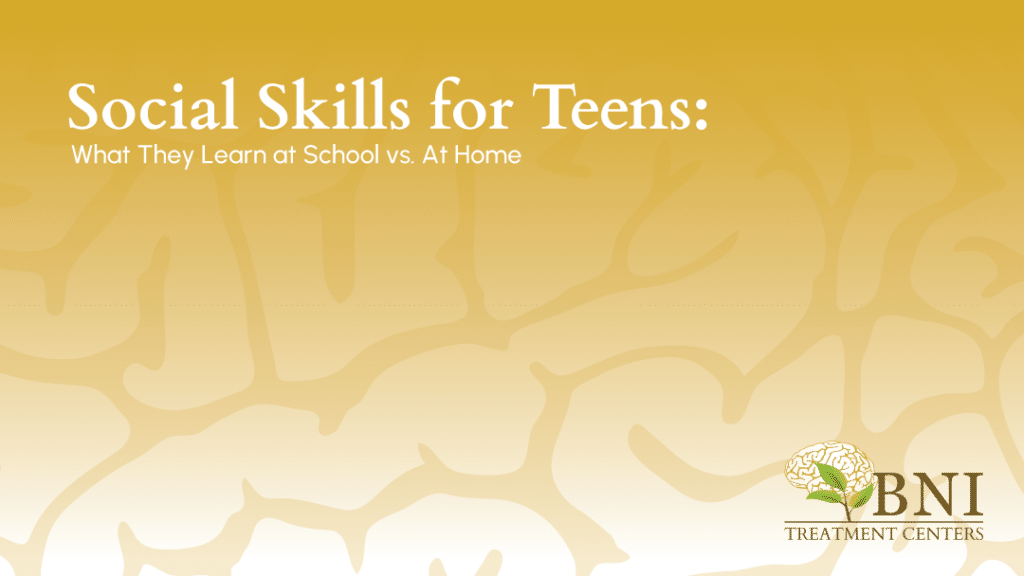
The U.S. Surgeon General called it an “Epidemic of Loneliness and Isolation”. And it certainly is for teens, with nearly 40% of adolescents feeling moderately to extremely lonely. Yet many teens lack the social skills to build and develop truly close relationships.
At BNI Treatment Centers, we know the challenges that teens go through every day – that’s why we provide educational assistance to all of our clients, enabling them to get the treatment they need without falling behind in their schoolwork.
Education is a part of everything we do. So today, we’re going to cover the basics of what you need to know about social skills for teens.
Understanding Social Skills for Teens
Your teen is at a critical point in their life – a midway point between childhood and adulthood, with a mixture of traits and responsibilities from both sides. Social skills are the tools they use to navigate this transition.
These tools enable them to succeed academically, empowering them to connect with their classmates and engage with their teachers. These tools also allow your teen to flourish socially, teaching them how to build effective and healthy relationships. Further, what your teen learns during this period will strongly influence their social abilities far into the future.
Key Social Skills for Teenagers
Like any set of skills, social skills improve with practice and time – and your teen is brand new to them. Social skills fall under a broad umbrella, including nonverbal and verbal components, actions, feelings, and more.
Foremost among these skills is empathy and active listening. Many children struggle to put themselves in someone else’s shoes. Empathy comes from social and neurological development, meaning it’s not innate. Actively listening and empathizing are among the most impactful social skills your teen is learning during this time – and teenagers are at the start of this learning process.
Other skills include reading social cues and body language, understanding etiquette and conflict resolution, as well as building and maintaining healthy relationships.

Causes of Struggles with Social Skills
The primary reason adolescents struggle with social skills is that they don’t have any practice. Their social and emotional awareness may be lower, as they process feelings and thoughts they’ve never experienced. Many teens lack confidence and are unwilling or unable to practice these critical skills.
These problems may be exacerbated if your teen spends most of their time online, avoiding in-person interaction in favor of digital. While some online socialization can be great, many components of social skills are left out in these environments – reading and using body language, for example.
Signs Your Teen Is Struggling with Social Skills
All teens struggle with social skills sometimes – all adults, too! But it’s important to recognize signs that your teen is experiencing greater obstacles than expected.
Your teen may consistently avoid eye contact or have trouble understanding nonverbal cues. This can be paired with social anxiety and nervousness. Listen to them when they talk. Do they have difficulties starting or keeping conversations going? Do they often use an inappropriate tone of voice?
Other signs include social isolation, such as avoiding spending time with their peers or developing close friendships. Pay attention when they interact with others. If your teen acts erratically, this is often a sign they’re unsure how to behave.
How to Help Teens Struggling Socially
While no two teens are the same, there are broad guidelines you can follow to help them grow and learn.
Model positive social behaviors, such as active listening and empathetic questioning, so your teen can see how they should and shouldn’t act. This is important in your interactions with your teen, but equally important in how you treat those around you. Teens learn by observation, and yours is likely paying much more attention than it seems.
Talk with your teen openly about their concerns, thoughts, and behaviors. Teens want to feel respected and heard. Providing a judgment-free outlet to discuss their social anxieties can be the first step toward helping them build these skills for themselves.
Encourage them to join social or sports clubs, support them in spending time with friends, and praise any behavior you want to see repeated. Praise is generally much more effective than criticism, and positive reinforcement is a powerful tool.
If, despite your efforts, your teen sees no positive change, it may be time to seek professional guidance.

Social Skills Help at BNI Treatment in the Los Angeles Area
Many teens living with poor social skills want to make a change. Nobody likes looking foolish, getting in trouble, or feeling left out. If your teen has tried to improve their social ability but can’t, it may be time to seek treatment for social anxiety. Here, trained psychiatrists can help your teen efficiently learn and implement the tools they need to succeed today and every day into their future.
With a laser focus on adolescent treatment, BNI Treatment Centers tirelessly works to give your teen the care and attention they need. We provide effective behavioral treatment options, skills training, and therapy to help your teen achieve the future they deserve. While they receive treatment, our educational assistance programs allow them to keep up and excel at their schoolwork. To learn more about our programs today, call us at (888) 522-1504.
BNI Treatment Centers: Science-based, evidence-backed, compassion-led.




